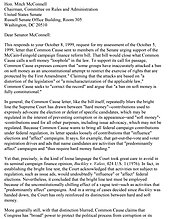Dear Senator McConnell:
This responds to your October 8, 1999, request for my assessment of the October 5, 1999, letter that Common Cause sent to members of the Senate urging support of the McCain-Feingold campaign finance reform bill. That bill would close what Common Cause calls a soft money “loophole” in the law. To support its call for passage, Common Cause expresses concern that “some groups have inaccurately attacked a ban on soft money as an unconstitutional attempt to restrict the exercise of rights that are protected by the First Amendment.” Claiming that the attacks are based on “a distortion of the legislation” or “a mischaracterization of the applicable law,” Common Cause seeks to “correct the record” and argue that “a ban on soft money is fully constitutional.”
In general, the Common Cause letter, like the bill itself, repeatedly blurs the bright line the Supreme Court has drawn between “hard money” — contributions used to expressly advocate the election or defeat of specific candidates, which may be regulated in the interest of preventing corruption or its appearance — and “soft money” — contributions used for all other purposes, including issue advocacy, which may not be regulated. Because Common Cause wants to bring all federal campaign contributions under federal regulation, its letter speaks loosely of contributions that “influence” elections and “affect” campaigns. It says, for example, that get-out-the-vote and voter registration drives and ads that name candidates are activities that “predominantly affect” campaigns and “thus require hard money funding.”


